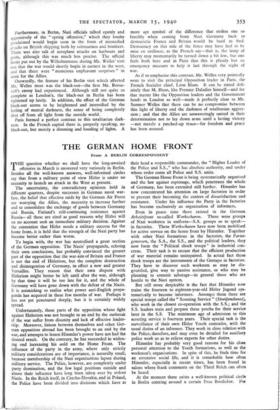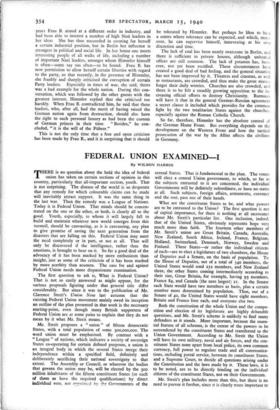THE GERMAN HOME FRONT
From A BERLIN CORRESPONDENT
THE question whether we shall have the long-awaited offensive in March is answered very variously in Berlin. Besides all the well-known answers, well-informed circles say that from a military point of view Hitler is under no necessity to launch an attack in the West at present.
The uncertainty, the contradictory opinions held in different quarters, despite successes in German naval war- fare, the belief that effective raids by the German Air Force are worrying the Allies, the necessity to increase further and to consolidate the exchange of goods between Germany and Russia, Finland's still-continuing resistance against Russia— all these are cited as good reasons why Hitler will on no account seek an immediate military decision. Against the contention that Hitler needs a military success for the home front, it is held that the strength of the Nazi party has become better rather than worse.
To begin with, the war has neutralised a great section of the German opposition. The Nazis' propaganda, echoing their own conclusions, has probably convinced the greater part of the opposition that the war-aim of Britain and France is not the end of Hitlerism, but the complete destruction and disintegration of Germany, in effect a new and greater Versailles. They reason that their own dispute with Hitlerism might better be left until after the war, although by that time it will be too late for it, and the whole of Germany will have gone down with the defeat of the Nazis. It is astonishing to realise what power anti-English propa- ganda has acquired in these few months of war. Perhaps it has not yet penetrated deeply, but it is certainly widely spread.
Unfortunately, those parts of the opposition whose fight against Hitlerism was not brought to an end by the outbreak of the war suffer from disunity and lack of effective leader- ship. Moreover, liaison between themselves and other Ger- man opposition abroad has been brought to an end by the war, and attempts to lessen Hitnmler's power have not had the desired result. On the contrary, he has succeeded in widen- ing and increasing his nold on the Home Front. The influence of the party in the army, where only strictly military considerations are of importance, is naturally small, because membership of the Nazi organisations lapses during military service. The Police, however, are completely under party domination, and the few legal positions outside and above their influence have long been taken over by ardent Nazis. In the Reich itself, in Czecho-Slovakia, and in Poland, the Police have been divided into divisions which have at their head a responsible commander, the " Higher Leader of the Police and S.S.," who has absolute authority, and under whose order come all Police and S.S. units.
The German Home Front is being systematically organised and the law against espionage, which penetrates the whole of Germany, has been extended still further. Himmler has now concentrated his attention on large factories in order to prevent their becoming the centres of dissatisfaction and resistance. Under his influence the Party in the factories has become exclusively an organisation of informers.
Even in peace time there existed in the German Arbeitsfront so-called Werkscharen. These were groups of Nazi workmen in uniform—S.A. groups so to speak— in factories. These Werkscharen have now been mobilised for active service on the home front by Himmler. Together with other Nazi formations in the factories, the Partei- genossen, the S.A., the S.S., and the political leaders, they now form the " Political shock troops " in industrial con- cerns. Their task is to ensure that the efficient production of war material remains unimpaired. In actual fact these shock troops are the instruments of the Gestapo in factories. They have to discover such workmen as may be dis- gruntled, give way to passive resistance, or who may be planning to commit sabotage—in general those who are hostile to the Nazi system.
But still more despicable is the fact that Himmler now trains the fourteen to eighteen-year-old Hitler Jugend sys- tematically to become informers. Amongst them there are special troops called the " Scouting Service " (Streifenchenst), who work in the closest co-operation with the S.S.; and the S.S. leaders train and prepare these youths for their service later in the S.S. The minimum age of admission to this scouting service is fourteen years. Their special task is the surveillance of their own Hitler Youth comrades, with the usual duties of an informer. They work in close relation with the Police, therefore, and may even be detailed for auxiliary police work so as to relieve experts for other duties.
Himmler has probably very good reasons for his close personal attention to the Youth formations, as well as the workmen's organisations. In spite of this, he finds time for an extensive social life, and it is remarkable how often Himmler, especially in recent times, has been found in salons where frank comments on the Third Reich can often be heard.
At the moment there exists a well-known political circle in Berlin centring around a certain Frau Boedicker. For years Frau B. aimed at a different order in industry, and had been able to interest a number of high Nazi leaders in her ideas. She has thus succeeded in creating for herself a certain industrial position, but in Berlin her influence is strongest in political and social life. In her house one meets interesting people of all walks of life, including a number of important Nazi leaders, amongst whom Himmler himself is often—some say too often—to be found. Frau B. has now permission to allow herself certain liberties with regard to the party, so that recently, in the presence of Himmler, she frankly and sharply criticised the corruption of certain Party leaders. Especially in times of war, she said, theirs was a bad example for the whole nation. During this con- versation, which was followed by the other guests with the greatest interest, Himmler replied that she criticised too harshly. When Frau B. contradicted him, he said that these leaders, who, after all, had the merit of having raised the German nation again from destruction, should also have the right to such personal luxury as had been the custom of German princes in their time. " Besides," he con- cluded, " it is the will of the Fiihrer."
This is not the only time that a free and open criticism has been made by Frau B., and it is surprising that it should be tolerated by Himmler. But perhaps he likes to ha' e a centre where tolerance can be expected, and which, mor.!- over, he can supervise himself, intervening at his ova discretion and time.
The lack of coal has been nearly overcome in Berlin, and there is sufficient in private houses, although unheat,d offices are still common. The lack of potatoes has, how- ever, not yet been rectified. These circumstances have created a good deal of bad feeling, and the general situation has not been improved by it. Theatres and cinemas, as well as restaurants, are crowded, and thus make the great masses forget their daily worries. Churches are also crowded, and there is to be felt a steadily growing opposition to the in- creasing official efforts to destroy Christianity. Rumours will have it that in the general German-Russian agreement a secret clause is included which provides for the common fight by the two totalitarian States against the churches, especially against the Roman Catholic Church.
So far, therefore, Himmler has the absolute control of the German Home Front. But everything depends on the development on the Western Front and how the tactical prosecution of the war by the Allies affects the civilians in Germany.























































 Previous page
Previous page